VIII
Ngalawa Races; Street Vendors
Tanzania is the first country in the history of water sports to have a ngalawa (dhow) competitive race using International Sailing Federation (ISAF) rules and regulations. According to Wikipedia, ngalawa is a traditional, double-outrigger canoe of the Swahili people living in Zanzibar and the Tanzanian coast. It is usually 5-6 meters long and has two outriggers, a centrally-placed mast (often inclining slightly towards the prow) and a single triangular sail. Many of these boats sail from the beach in front of our house. The fishermen use them.
 |
| Ngalawas ready for the race |
 |
| Skippers meeting pre-race |
The race took place on a beach a few hundred yards down from our house. This was the first time we had actually ventured out the gate onto the beach and through the fishing village that exists outside our wall. The village is a cluster of a few shelters built from whatever has been available. The main focus of the people there is the sea, their boats, and fishing. Small fires heat water and cook food. Lines strung between the few trees on the beach dry clothes. The path takes a winding route along the narrow strip of sand which these traditional people occupy. Finding ourselves amidst the shelters themselves, we opted to abandon the path and continue along the waterline on the beach. Ducking under lines holding beached vessels to the shore and wading around others we were soon at the site of the event.
 |
| Walking our beach |
 |
| crew steadying the boat |
 |
| putting on his ridder and striking a pose |
The ngalawas lined the shore facing out to the bay minded by crew who would occasionally have to re-secure them to the sand ahead of the advancing tide. There were twenty or so. The skippers were gathered in a group variously engaged in skippers meetings with race officials to confirm the racecourse and rules, and otherwise waiting for the race to begin. The race included official sponsors who provided new sails for each entrant and tee shirts for the captains and crew; the former in blue and the latter yellow. Each entrant was given a small stipend to help them prepare for the race and cash prizes would be awarded to the first three official finishers.
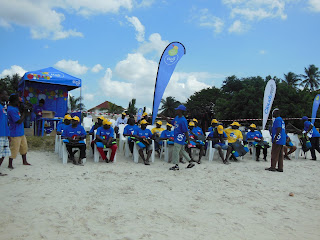 |
| The skippers |
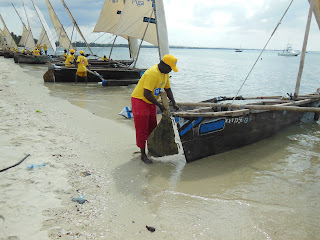 |
| Putting the rudder on. It won't be long now! |
 |
| Introducing the skippers |
We spoke to the Norwegian couple who organized the race. They said that they felt that the culture of the fishermen of Tanzania was being lost because people were actually unaware of its existence. The dhows are prominent all along the coastline, but the true essence of the fishermen’s lives is not so readily apparent. We have the village stretching from our house to the fish market down the shore. We watch daily what they do and how they live. The publicity from the race, they felt, would bring attention to the lives of the fishermen, the richness and historical significance of their culture, and to the problems they face today trying to sustain that traditional way of life.
 |
| Last minute preparations |
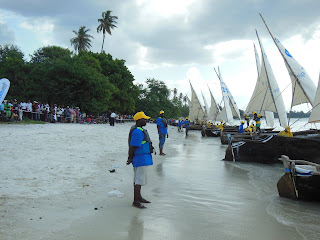 |
| The skippers wait for the horn |
The Dar es Salaam Yacht Club, across the bay from the race start, provided marks, committee and umpire boats for the race. The Tanzanian Minister for Information, Culture and Sports made some opening remarks. The Captains were then each introduced after which they joined their crews. As the horn sounded, the boats were pushed off beach and into the water; the race began.
The race begins
 |
| Smooth start for most |
The boats themselves are made from logs. They often have the appearance of being totally unseaworthy, but optimism exudes from the names and markings brightly painted on the weathered hulls. They move through the water swiftly and the captains and crew are skilled sailors. The fleet remained in a tight formation through the first turn at the first mark. Then, as in most yacht races, the sails separated across the skyline like opening a fan, as the speed of the hulls and skills of the crews were tested in time honored fashion.
 |
| Close quarters at the start |
 |
| Rounding the first mark |
There was a winner, and a second and third place; but the first and second to finish, both well regarded and skilled sailors who beached their craft to the cheers of a large crowd, were both disqualified for having missed marks during the race. At the awards ceremony, a detailed explanation of the rules and their importance was given to the crowd before the winners were announced. By all accounts, the people were pleased that rules were in fact followed. Some speculate that because too often in Tanzania, rules are broken or not enforced based on things political or financial, the adherence to them in this new venture was actually appreciated.
 |
| The race |
As they sailed past our house in the evening after the race, even from our vantage on our rooftop terrace, the pride of the sailors could be seen on the faces and in the demeanor of the crews as they sailed past. They knew that even though they are poor fishermen who risk their lives each day to eke out a living, they had earned the respect of every spectator at the event that day.
 |
| Sail-by after the race |
Merely eking out a living is something that the vast majority of Tanzanians do. Small wages for hard work is the norm. Whether it is the drivers, the maids, or the street vendors, earning a living wage is difficult.
 |
| Selling coconuts for the milk |
The street vendors are all over the streets of the city center, some with tables set along the sidewalks, others standing or walking about. The sellers of gum, single cigarettes and mints all have the same distinctive way they hold and click the coins together in the palm of their free hand as they walk the streets of the city. Of all the vendors, I am most fascinated by those who ply the daily traffic jams. In the true sense of making good fortune out of someone else’s bad fortune, the vendors in the traffic jams provide a means of buying anything and everything that is sold in stores without having to make the trip. It is easy to sit and brood while caught in a traffic jam for a half an hour or more. Brooding does not help the traffic move, nor, does it seem, do the traffic police trying to manage it all. Better to shop.
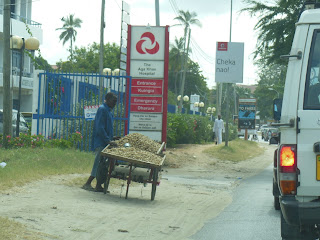 |
| Peanuts in the shell |
 |
| Fruit |
I have purchased fruit, floor mats for the car, electrified tennis rackets to zap mosquitos and other items while sitting in the car waiting to move. Newspapers, magazines, CDs, DVDs, DC power cords, hats, shoes, clothes, candy, ice cream, fruit, coconuts, water, soda, belts, car floor mats, the requisite red triangle and fire extinguisher for the car, car jacks, tables, pictures, cashew nuts, potato chips, toys, maps of Tanzania, virtually anything you may need is available from a vendor in the traffic jam; and the prices are negotiable as well. No need to worry if the traffic moves in the middle of a transaction, the vendor will catch you up as soon as the car stops again.
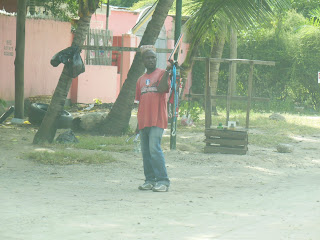 |
| Triangles, jacks, things for the car |
 |
| Phone chargers for the car |
 |
| DVDs |
 |
| Picture |
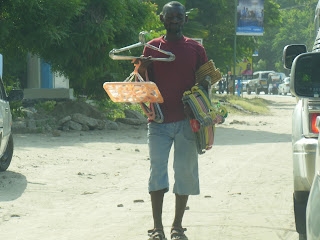 |
| Clothes hangers |
 |
| Toys |
 |
| Treats |
 |
| Potato chips |
The beggars are there too. There are, the ones with deformities, most, easily corrected with surgery unavailable to them, the ones who cannot walk but have been given the three wheeled tricycles propelled by hand power, and of course, the women with babies. The street here presents the best and worst of humankind; human ingenuity at its best as vendors make a living selling; and human neglect where those who have been cast off as useless are relegated to begging for their survival. Social Darwinism is now in place in this former Socialist state. One last thought about the traffic jams. I follow the route that the Prime Minister takes daily to and from his work. As the sirens screech, the cars pull over, and the motorcade carrying the Prime Minister to his home passes undaunted. The contrasts here are extreme.
Until Next Connection,
Dan



























No comments:
Post a Comment